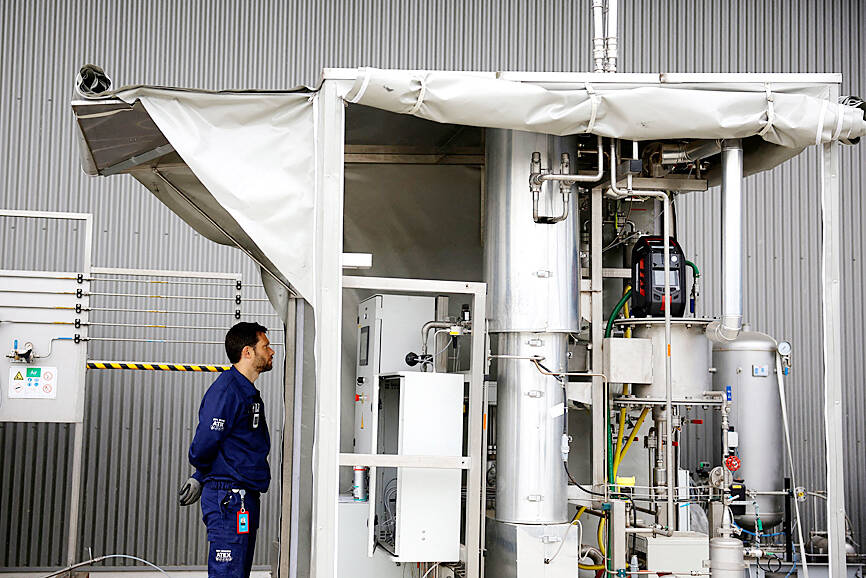The share of bank finance going to renewable energy rather than fossil fuels has changed little in six years, raising questions about how fast lenders are pushing energy clients to become greener, according to research published yesterday.
Since 2016 renewable energy has taken 7 percent of US$2.5 trillion in bank loans and bond underwriting for energy activities, according to a report commissioned by environmental groups including Sierra Club and Fair Finance International.
The total annual sum banks have facilitated into renewable energy rose to a high of US$34.6 billion in 2021, from US$23.2 billion in 2016, but the amount going to fossil fuels increased too, keeping renewables’ share broadly the same.

Photo: Reuters
Last year the share of renewable energy in funding was 8 percent while in 2021 and 2020 it stood at 10 percent and 7 percent respectively.
“Banks’ financing to fossil fuels should be phasing out as financing to renewables increases drastically to have any chance of reaching the world’s — and their own — climate goals,” said Ward Warmerdam, researcher at Profundo, which compiled the data.
Lenders say they must finance fossil fuels given global energy needs, but that they are helping firms transition to low-carbon future.
Renewable companies often tap private and government finance too, they added.
“This report does not provide a comprehensive view of clean energy investment,” said a spokesperson for The Glasgow Financial Alliance for Net Zero, a major grouping of financial institutions
The spokesperson pointed to analysis from the International Energy Agency which suggested that between 2021 and last year around 48 percent of total energy investment went to low-carbon energy supply.
JPMorgan Chase & Co, Citigroup Inc and Barclays PLC’s renewable energy share was 2 percent between 2016 and last year and the Royal Bank of Canada’s 1 percent, the report said. Citi declined to comment. JPMorgan, Barclays and RBC did not respond to requests for comment.
The research covered 60 of the world’s biggest lenders and 377 energy firms. It excluded biomass, nuclear and carbon capture and storage from its renewable energy definition.

TAKING STOCK: A Taiwanese cookware firm in Vietnam urged customers to assess inventory or place orders early so shipments can reach the US while tariffs are paused Taiwanese businesses in Vietnam are exploring alternatives after the White House imposed a 46 percent import duty on Vietnamese goods, following US President Donald Trump’s announcement of “reciprocal” tariffs on the US’ trading partners. Lo Shih-liang (羅世良), chairman of Brico Industry Co (裕茂工業), a Taiwanese company that manufactures cast iron cookware and stove components in Vietnam, said that more than 40 percent of his business was tied to the US market, describing the constant US policy shifts as an emotional roller coaster. “I work during the day and stay up all night watching the news. I’ve been following US news until 3am

UNCERTAINTY: Innolux activated a stringent supply chain management mechanism, as it did during the COVID-19 pandemic, to ensure optimal inventory levels for customers Flat-panel display makers AUO Corp (友達) and Innolux Corp (群創) yesterday said that about 12 to 20 percent of their display business is at risk of potential US tariffs and that they would relocate production or shipment destinations to mitigate the levies’ effects. US tariffs would have a direct impact of US$200 million on AUO’s revenue, company chairman Paul Peng (彭雙浪) told reporters on the sidelines of the Touch Taiwan trade show in Taipei yesterday. That would make up about 12 percent of the company’s overall revenue. To cope with the tariff uncertainty, AUO plans to allocate its production to manufacturing facilities in

Six years ago, LVMH’s billionaire CEO Bernard Arnault and US President Donald Trump cut the blue ribbon on a factory in rural Texas that would make designer handbags for Louis Vuitton, one of the world’s best-known luxury brands. However, since the high-profile opening, the factory has faced a host of problems limiting production, 11 former Louis Vuitton employees said. The site has consistently ranked among the worst-performing for Louis Vuitton globally, “significantly” underperforming other facilities, said three former Louis Vuitton workers and a senior industry source, who cited internal rankings shared with staff. The plant’s problems — which have not

COLLABORATION: Given Taiwan’s key position in global supply chains, the US firm is discussing strategies with local partners and clients to deal with global uncertainties Advanced Micro Devices Inc (AMD) yesterday said it is meeting with local ecosystem partners, including Taiwan Semiconductor Manufacturing Co (TSMC, 台積電), to discuss strategies, including long-term manufacturing, to navigate uncertainties such as US tariffs, as Taiwan occupies an important position in global supply chains. AMD chief executive officer Lisa Su (蘇姿丰) told reporters that Taiwan is an important part of the chip designer’s ecosystem and she is discussing with partners and customers in Taiwan to forge strong collaborations on different areas during this critical period. AMD has just become the first artificial-intelligence (AI) server chip customer of TSMC to utilize its advanced